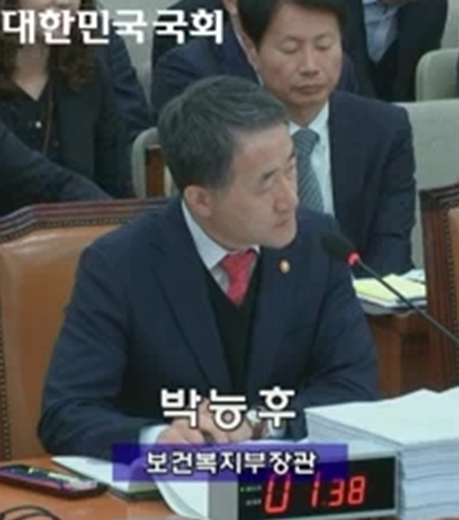Minister of Health and Welfare Park Neung-hoo said Monday the government is considering how to send antiparasitic drugs to North Korea, following recent reports of a North Korean defector being riddled with intestinal worms.

“We will examine measures to send antiparasitics to North Korea and report (back on findings) as the government is seriously considering ways to increase the welfare of the North Korean residents,” Minister Park said at a National Assembly meeting Monday.
Park’s comment comes shortly after the discovery of an “enormous amount” of parasites, including one as long as 27 centimeters, in a North Korean soldier who defected to the South last Monday.
“Antiparasitics need to be taken only once a year. The Ministry of Health and Welfare will work with the Red Cross and the Ministry of Unification to discuss sending antiparasitics to the North,” Minister Park said in response to a proposal from Rep. Park In-sook of the opposition Bareun Party to send parasiticides to the neighboring country.
“Seeing parasites in the defected North Korean soldier’s body was a shock. Most (South Korean) doctors have probably never seen (this) recently,” he said.
The parasites in the defector are thought to be roundworms, which are large, multicellular organisms visible to the naked eye. These worms can live in the stomach, blood, lymphatic system or subcutaneous tissues and feed off the host, according to the U.S. Centers for Disease Control and Prevention. They can range anywhere from 1 millimeter to 1 meter in length.
People may contract roundworms by eating vegetables fertilized with human manure. Human feces produced from eating these plants may then be recycled to grow more vegetables, which increase the roundworm population.
Experts have pointed to a lack of chemical fertilizer in the North to be a possible cause for parasites in the soldier and other North Korean defectors. A 2015 study from Dankook University College of Medicine on the clinical status of North Korean defectors from 2006 to 2014 had revealed seven out of 17 North Koreans had parasites.
The study also revealed that 68 patients had comorbidities, the most common being tuberculosis (13.6 percent), chronic hepatitis B (10 percent), and chronic hepatitis C (9.4 percent).
Infectious diseases such as tuberculosis, hepatitis and malaria are the most common diseases in North Korea, according to Professor Kim So-yoon from Yonsei University Medical School.
“Medicine is most urgently needed in the North since most drugs in North Korea are smuggled from China, and its components are unidentifiable,” said Professor Jeon Woo-taek from Yonsei University Medical School.
Antiparasitics are a class of medications used to treat parasitic diseases by either destroying or inhibiting their growth in the body. Treatment takes a few days at most, although it depends on the type of worm.
Related articles
- N. Korean defector ‘dust off’ by US Army’s air medics
- Defector provides glimpse into N. Korean soldiers’ lives
- Parasites make treatment of N. Korean defector harder, doctor says
- N. Korean soldier, shot while crossing border, in ‘critical’ condition
- N. Korean defector has hepatitis B, inactive tuberculosis
- Doctor strikes back at lawmaker’s criticism regarding N. Korean defector

